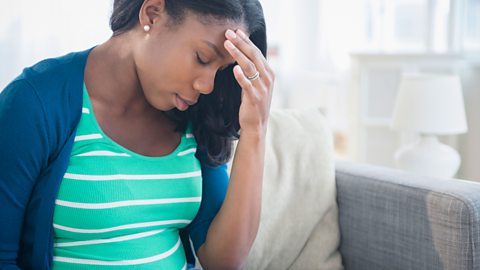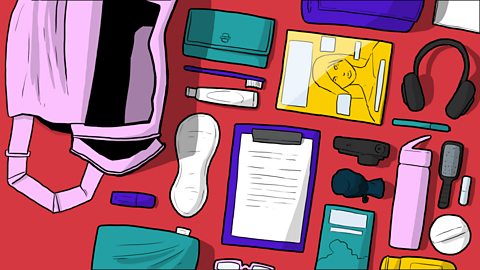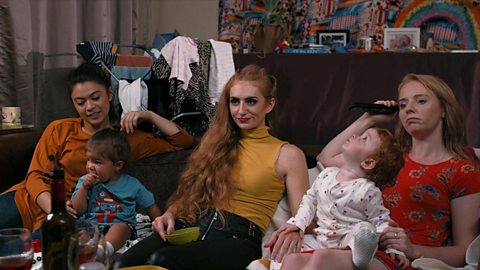Eating well is always a good idea, but itÔÇÖs particularly important when youÔÇÖre pregnant ÔÇô and means that your baby will get all the nutrients they need to develop and grow.
We've provided some straight answers to some common pregnancy food questions below.

What foods should I avoid during pregnancy?
It might seem that lots of stuff is off-menu, but your diet doesnÔÇÖt actually need radically change when youÔÇÖre pregnant ÔÇô apart from a few exceptions.
These include alcohol of course, plus some cheeses, liver, partially cooked eggs and meat (make sure steaks are cooked through), certain types of fish, p├ót├® and some cured meats.
You should also limit your daily caffeine intake to the equivalent of two cups of instant coffee.
For full details, check out the .
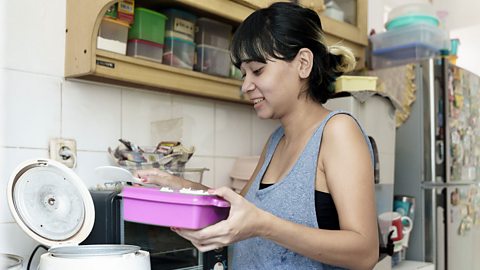
Do I need to eat for two in pregnancy?
The idea of ÔÇÿeating for twoÔÇÖ is a myth.
YouÔÇÖre eating for one plus a tiny bit, and only need to increase your calorie intake during the third trimester.
In the first and second trimesters, youÔÇÖre advised to eat as normal and then after 27 weeks, eat an extra 200 extra calories ÔÇô equivalent to a sandwich or two small bananas.
What are Healthy Start vouchers?
If youÔÇÖre pregnant or have a child under four, and receive benefits, the Healthy Start scheme gives you vouchers so you can buy basic healthy foods like milk or fruit or vegetables.
You can also get coupons to swap for free vitamins.
For more information .
What should I eat if IÔÇÖm feeling sick in pregnancy?
Sounds obvious but avoid anything that triggers your sickness.
Drink plenty of water to stay hydrated and go for small, regular meals of plain high-carb, low-fat foods like rice or pasta.
Eating cold foods may be helpful as they tend to have less aroma than hot foods.
Some women find that foods and drinks containing ginger can help.
If your nausea and vomiting is severe and doesn't improve, speak to your GP.
How can pregnant women avoid heartburn?
It can help to eat small, regular meals, rather than larger meals spaced out.
Avoid anything fatty or spicy, eating too close to bedtime ÔÇô and donÔÇÖt lie down after a meal.
If lifestyle changes donÔÇÖt work, you can take pregnancy-friendly medicines, so speak to your GP.
Do pregnant women need to drink more water?
ThereÔÇÖs no specific recommendation to drink more ÔÇô just to stay hydrated, which is extra-important if you are experiencing morning sickness.
Your body will give you some obvious signs if youÔÇÖre not drinking enough, such as feeling thirsty and dark-coloured urine (it should be the colour of light straw).
What is a healthy amount of weight to gain when pregnant?
Again, thereÔÇÖs no definitive answer to this as everyoneÔÇÖs different: the guidance is simply that you shouldnÔÇÖt gain too much or too little.
Most women gain around 10kg and 12.5kg (22lb to 26lb).
Why have I gone off certain foods during my pregnancy?
This is quite common. Your tastebuds change during pregnancy and you have a heightened sense of smell, so things you might have loved suddenly seem totally grim.
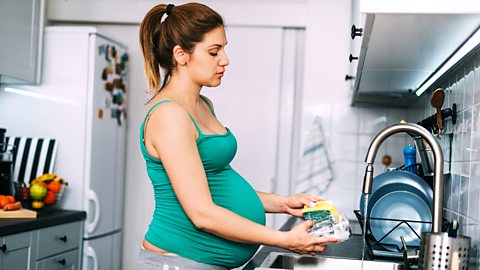
How do I prepare food safely for pregnancy?
ItÔÇÖs even more important to follow safe food practices when pregnant: simple things like washing your hands regularly, avoiding cross-contamination of raw and cooked foods, washing soil off fruit and veg and cooking everything thoroughly, particularly meat and fish.
Do my pregnancy cravings mean anything? What if I crave non-foods?
Despite all the old wivesÔÇÖ tales, thereÔÇÖs no evidence that they definitely mean anything.
Having said that, speak to your GP or health visitor about anything unusual. Wanting to chew ice or craving inedible things, such as dirt or coal might be a sign of anaemia, if youÔÇÖre eating lots of sugary stuff it might mean your blood sugar levels are haywire and too much salt might increase your blood pressure.
Is it OK to be vegetarian or vegan during pregnancy?
Yes, but like all mums-to-be, make sure your diet is healthy and balanced.
Iron and calcium are really important for pregnant women, but as meat, fish and dairy products are key sources, youÔÇÖll have to plan your meals well if youÔÇÖre veggie or vegan.
Dark green leafy veggies like kale and pulses such as kidney beans are great sources of each.
Good levels of vitamins D and folate are tricky for everyone to get from diet alone, so .
Speak to your midwife or GP about getting all the nutrients you and your baby need ÔÇô and for recipe inspiration during pregnancy visit │╔╚╦┐ý╩Í Food.
Article produced with help from Pamela Mills, an NHS midwife based in Greater Manchester.

